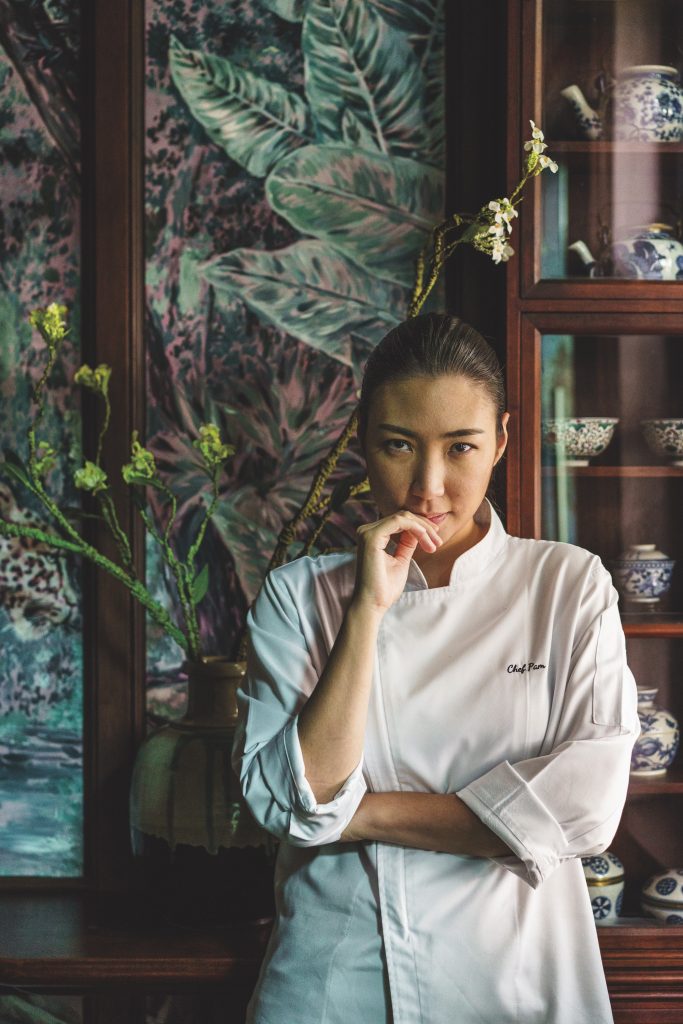with
Learn more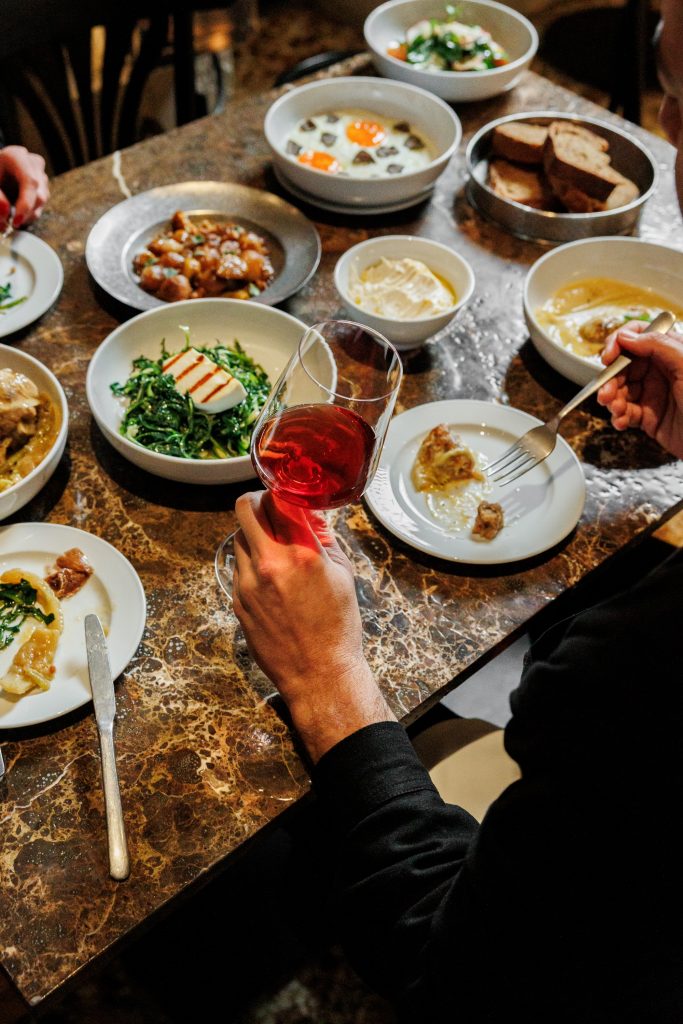
The Essence of Athens
By returning to the roots of Greek cuisine, the city’s chefs are reaching new culinary heights.
In a handsome neoclassical villa in the Athenian neighbourhood of Pangrati, chef Tasos Mantis is taking food back to its roots. The garden he tends with his father in Alepochori, an hour’s drive west of Athens, is the source of many of the ingredients at his Michelin-starred restaurant, Soil. “The garden is where we test ideas, observe natural rhythms, and rediscover forgotten flavours,” he says. “It teaches us to cook differently.”
Mantis’s approach to gastronomy is based on instinct and restraint, with a deep respect for the land that translates into tasting menus that go far beyond a simple meal. “We’re here to share something honest,” he says. “If a guest leaves Soil having tasted a flavour they didn’t expect or with a memory triggered, then we’ve succeeded.”
During my dinner at Soil, seeing tiny alyssum petals piled atop a delicate ball of chopped squid takes me back to my grandfather’s garden as a small child. I can even smell the flowers that used to blossom in sweet, pillowy patches along the lawn. It’s a powerful—and surprising—feeling, one of many experienced during a recent trip to the capital city.
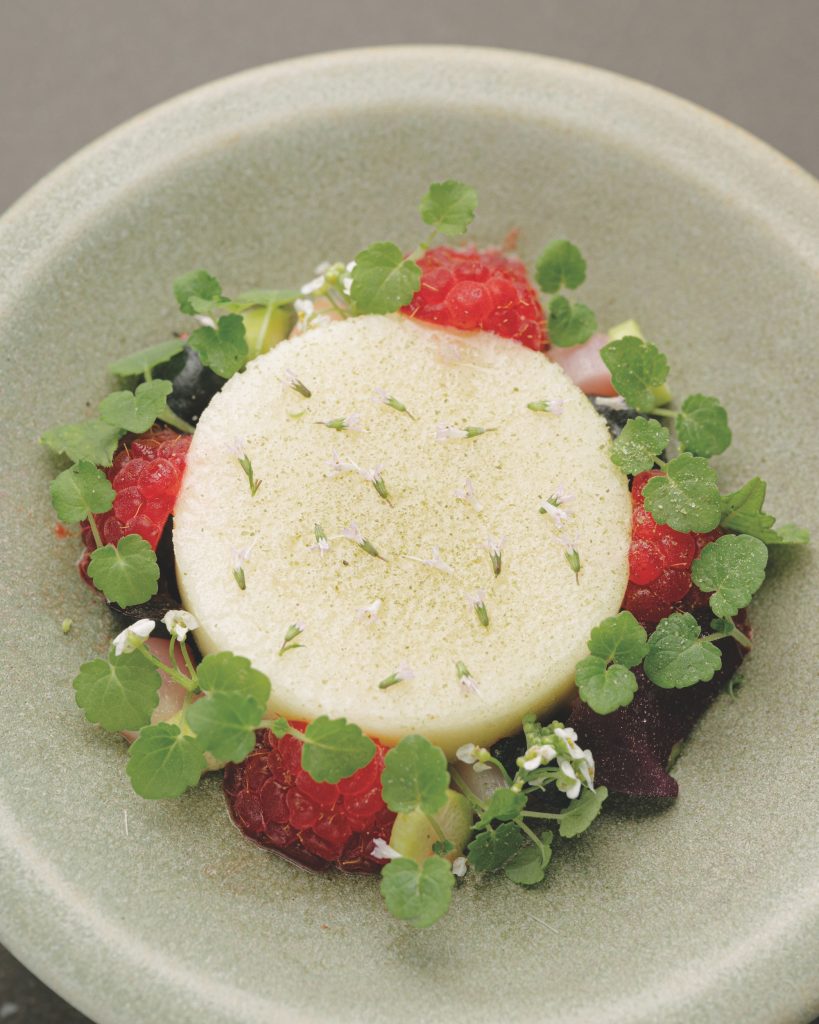
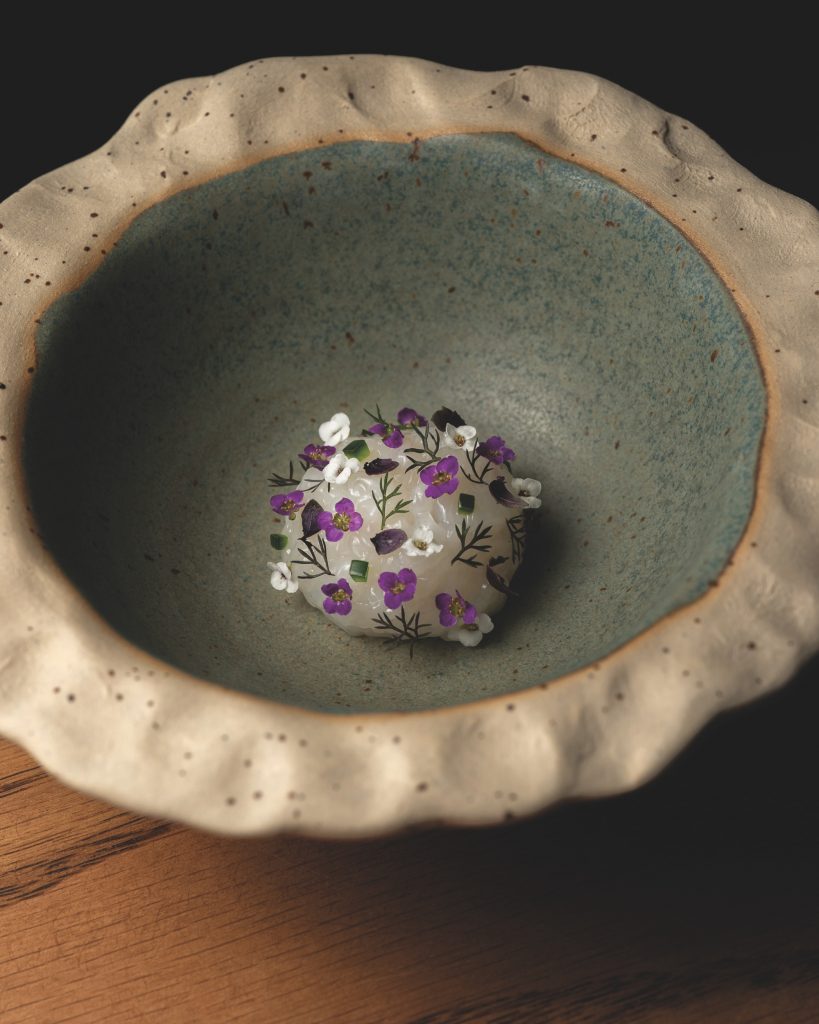
There’s an intoxicating energy in Athens right now. What was once seen by many as a necessary stop on the way to the Greek Islands is drawing an increasing number of international visitors each year. The city boasts showstopping heritage sites, exceptional museums and galleries, and a calendar packed with cultural events, like the upcoming Greek National Opera performance of Rigoletto at the Odeon of Herodes Atticus amphitheater in July and Robbie Williams’s October tour stop at the marble Panathenaic Stadium.
In this city that looks simultaneously to its past and future, many of the moment’s hottest restaurants take inspiration from the traditional neighbourhood kafeneio—part old-school coffee shop, part bar—and tavernas, the much-loved convivial, casual restaurants serving Greek favourites that are a magnet for travellers.
In the Psyrri neighbourhood, Taverna Klimataria has been welcoming Athenians since 1927 with traditional live music played beneath grape vines, accompanied by homestyle dishes like pork knuckle, meatballs, and stuffed peppers. Over in Pangrati, just behind the Panathenaic Stadium, Vyrinis, a mainstay for decades, serves comfort foods in a cheery courtyard, while a short walk away at Mavros Gatos, plates come piled high with meat—lamb chops, juicy sausages, liver—sourced from farmers across the country, accompanied by good house wine that costs just $9 a carafe.

It was this unfussy style of cooking and commitment to local Greek produce that inspired food and travel writer Fotis Vallatos and three friends—a chef, a wine connoisseur, and a baritone opera singer—to open their restaurant Pharaoh in late 2022. “The idea stemmed from a shared passion that we have for the kafeneio culture in Greece, those multipurpose, old-school places that function as cafés, tavernas, bars, and, in the past, often as barber shops, post offices, and general stores,” says Vallatos. “But most importantly, they’ve always been social hubs, and sometimes centers for heated political debate. We wanted to bring this raw, authentic style of cooking into a proper restaurant setting in Athens, paying homage to its roots while elevating it.”
At first glance, Pharaoh doesn’t inspire much confidence: the restaurant is located on a dark, graffiti-covered street between two gray concrete buildings. But once you notice the light emanating from inside, the clink of glasses and the buzz of laughter audible from the street as people spill out onto the pavement, it’s clear something special is happening.
With its industrial-chic interiors combining stone walls, terrazzo floors, concrete pillars, and marble-topped tables, Pharaoh feels like a microcosm of Athens itself—a little rough around the edges yet full of life, with an appreciation for good food, good wine, good music, and good times. The best seats are at the stainless-steel bar counter where a DJ spins vintage vinyl.
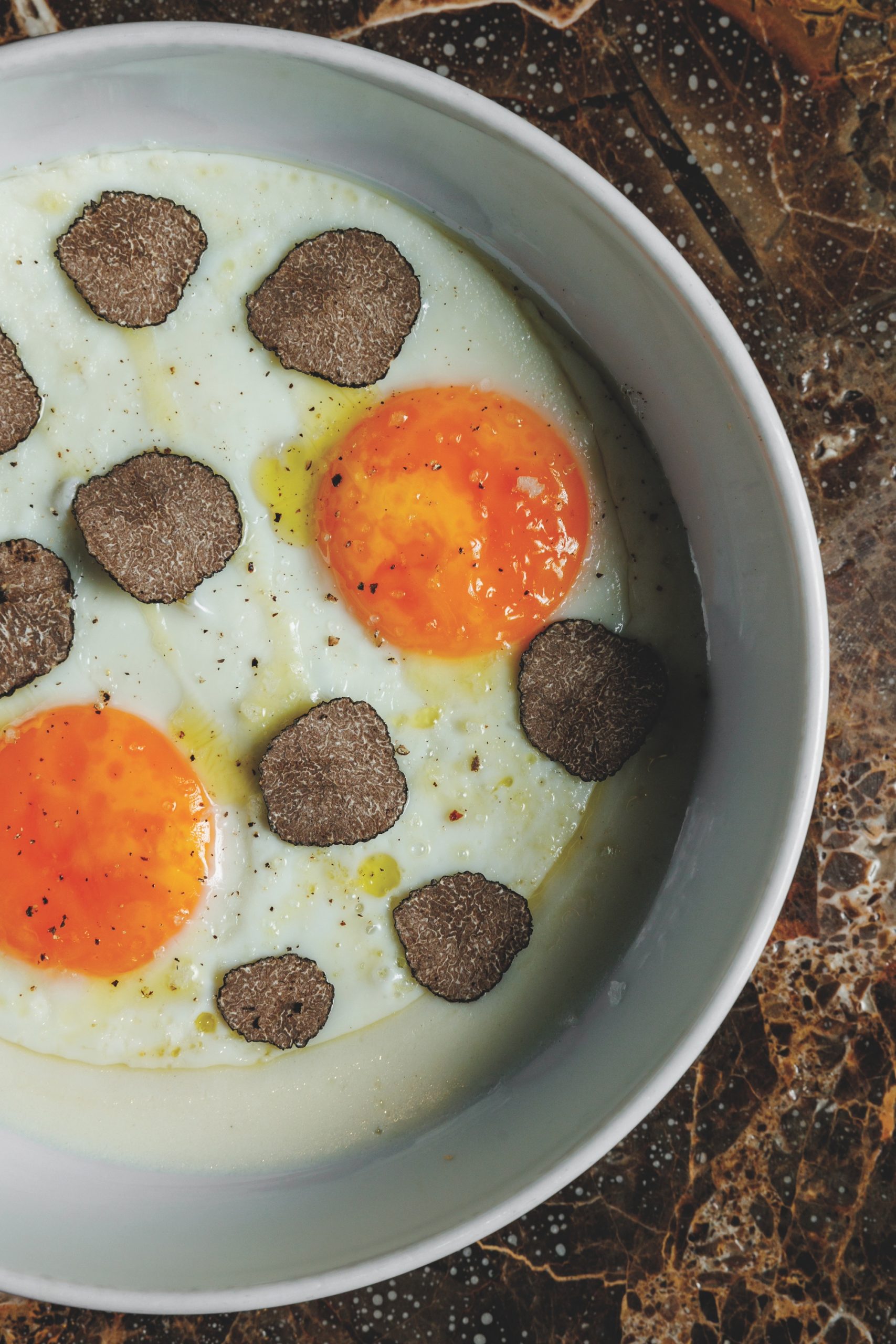

“The neo-bistro movement revitalized French cuisine…. That’s exactly what we’re seeing in Athens today, with a wave of new restaurants that focus deeply on traditional Greek food that’s elevated and presented in more vibrant spaces.”
—Fotis Vallatos, co-owner of Pharaoh
A counterpoint to the restaurant’s gritty urban setting, the cuisine is rooted in the home-cooked meals of Greece’s villages: hearty, fresh, and unpretentious, like the food my Greek boyfriend’s family cooked for me the first time we came on summer vacation together. At Pharaoh, there’s a deep appreciation for Greek culinary heritage in dishes like taramosalata—ubiquitous in tavernas across the country but here cloud-like in its lightness and topped with bottarga. Squid stewed in spinach combines rich flavours of land and sea, and grilled wild horta greens are infused with a charcoal smokiness, their bitterness tempered by a chunk of light and creamy anthrotyro cheese. Vallatos sees Pharaoh’s culinary approach as a revival of traditional Greek cuisine in its purest form, with chef Manolis Papoutsakis and team relying on charcoal grills, as well as wood-fired stoves and ovens, to cook their seasonal ingredients.
“You won’t find tomatoes, aubergines, or courgettes on our menu in winter,” says Vallatos. “In summer, we don’t serve broccoli, cabbage, or chestnuts, and we don’t use frozen produce or farmed fish.” Dishes are slow cooked over flames, allowing time for conversation and the restaurant’s extensive selection of natural wines to flow. “We feel that Pharaoh offers a return to authenticity, stripped of unnecessary modern interference,” he says, pointing to parallels between the dining scene in Athens and that of France 25 years ago. “The neo-bistro movement revitalized French cuisine and gave a platform to new chefs and fresh projects to shine, offering more casual and accessible food,” he says. “That’s exactly what we’re seeing in Athens today, with a wave of new restaurants that focus deeply on traditional Greek food that’s elevated and presented in more vibrant spaces.”

Chef Luca Piscazzi at the Michelin-starred restaurant Pelagos inside Four Seasons Astir Palace Hotel Athens.
At Four Seasons Astir Palace Hotel Athens—a seaside resort that sprawls over a pine-clad peninsula south of the city center—chef Luca Piscazzi finds Greek produce to be a constant source of inspiration. While his cuisine at Pelagos, the hotel’s Michelin-starred restaurant, blends his Italian heritage and French techniques, the ingredients he uses are predominantly Greek. Since his arrival in the country in 2019, Piscazzi has been venturing out into remote areas and islands to connect with small-scale artisanal producers, farmers, and other chefs. “These communities have a really strong sense of pride, and they’re keen to safeguard their traditions but also eager to stretch their culinary boundaries,” says Piscazzi, who has introduced hyperlocal products to his menus over the years, like kariki—a spicy blue cheese fermented in a gourd—from the island of Tinos.
Greece has influenced not only the ingredients Piscazzi uses but also how he uses them, and his culinary style has evolved to focus more on flavour. “The plate still needs to look nice, but now I try to make things more simple, more straightforward, and without too much decoration,” he says. “I try to remove things rather than add them.” His menu embraces earthy ingredients in dishes that are delicate, comforting, and, for a fine-dining setting, refreshingly uncomplicated. A mandarin orange filled with sea urchin and koji mousse topped with osetra caviar is sweet, citrusy, and salty, the individual flavours revealing themselves in each layer. A twist of cold spaghetti with a clam emulsion and creamy almond sauce is inspired by Piscazzi’s tendency to eat leftover pasta straight from the fridge. John Dory comes à la meunière, marinated in bergamot with crisp cavolo nero and sweet winter persimmon, and the monkfish osso buco is a rich and meaty triumph, perfect for a chilly winter night.
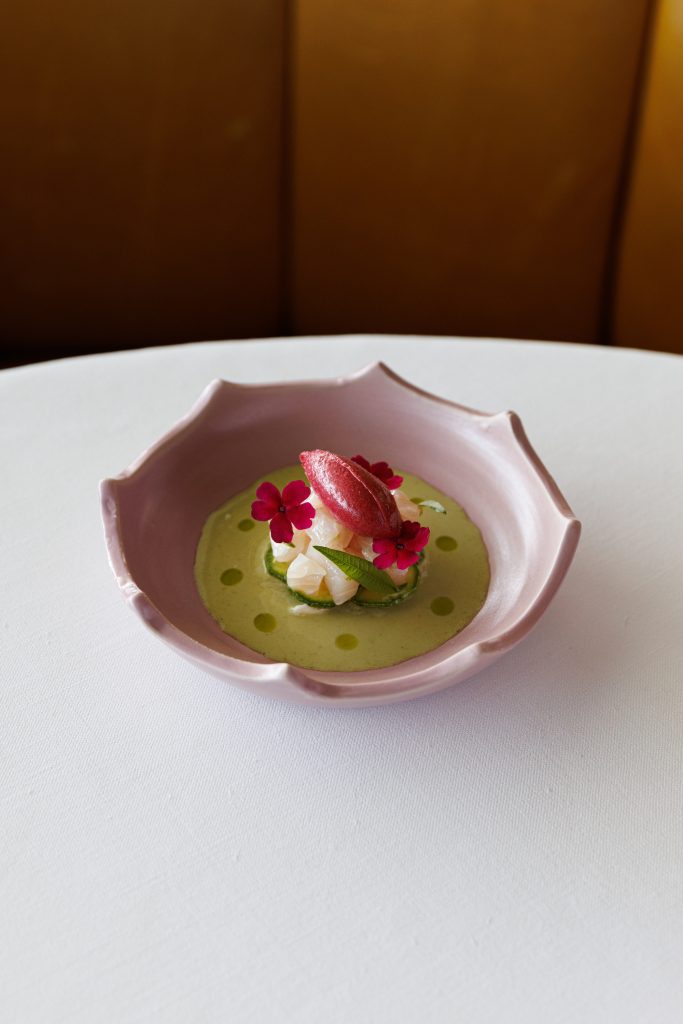
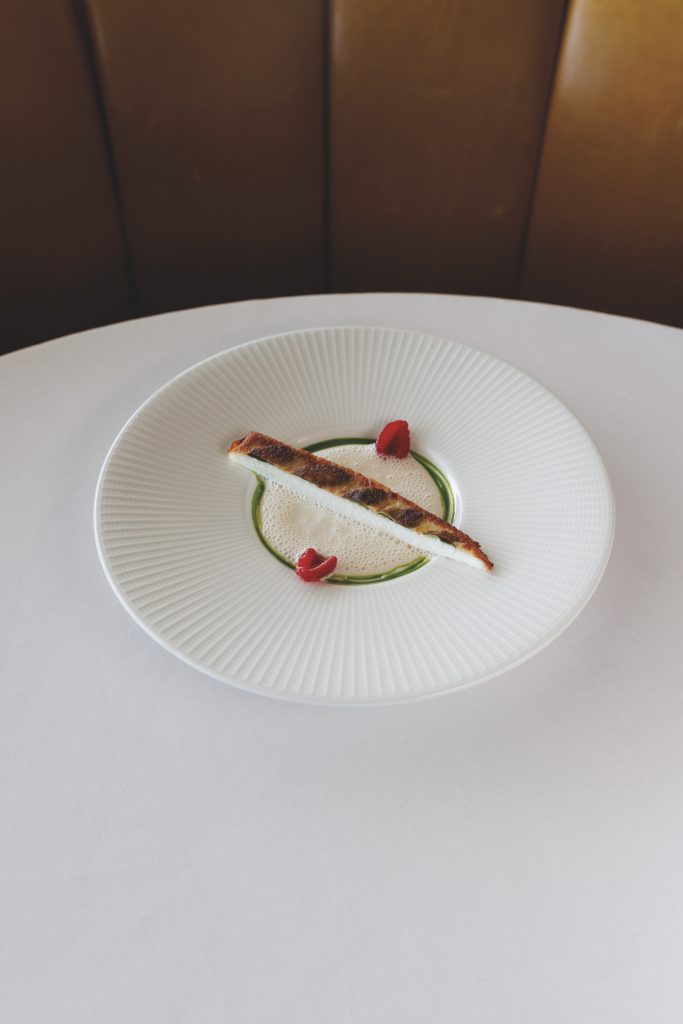
Chef Adam Kodovas’s two-year-old Ex Machina, located on a steep street in Pangrati, is equally rooted in Greek produce, peppered with influences and ingredients drawn from his Greek-Egyptian background and experience working in restaurants overseas. Kodovas’s food is reflective of his multicultural heritage, made with around 95 percent Greek products complemented by spices from Cairo’s Khān al-Khalīli bazaar, miso from Japan, and curry from Thailand and India. Many dishes evolve with the changing seasons, while those that don’t rely on seasonality stay true to their original form all year. The eggplant tartlet with miso, aged cheese, and feteer (a type of layered pastry) takes its inspiration from an Egyptian chef’s recipe and the markets of Cairo. Zero-waste gyoza are based on kitchen trimmings made into a rich ragu. No Man’s Pasta is a permanent favourite on the menu, inspired by a dish Kodovas’s mother called “orphan’s pasta.” “She used to make it when we couldn’t afford to have pasta with meat, and instead we’d just have it with butter and cheese,” he says. “I turn it into a kind of Japanese tsukemen dipping noodle dish, with a thick broth from fish trimmings smoked over fire in the bottom of the bowl.” On the surface it looks like plain pasta. Mix it all up, and it’s a delicious discovery.
Kodovas—whose many tattoos include the phrase “Hold Fast” inked across his fingers—feels that his background brings something different to the Athens food scene. His parents split up when he was nine years old, and he spent much of his life ignoring his Egyptian heritage. But a chance encounter with some customers from Cairo during the COVID-19 pandemic led to a chain of events that included a return to Egypt after 30 years, a family reunion, and the opening of Ex Machina with his new Egyptian friends as co-investors. “The name of the restaurant, from the phrase deus ex machina, refers to solving an unsolvable problem,” he says. “I made a lot of mistakes on the way, but I’m now at the stage in my life where I have this experience, and I can offer something unique. I developed a style of food that can’t easily be replicated, and I think it’s exciting.”
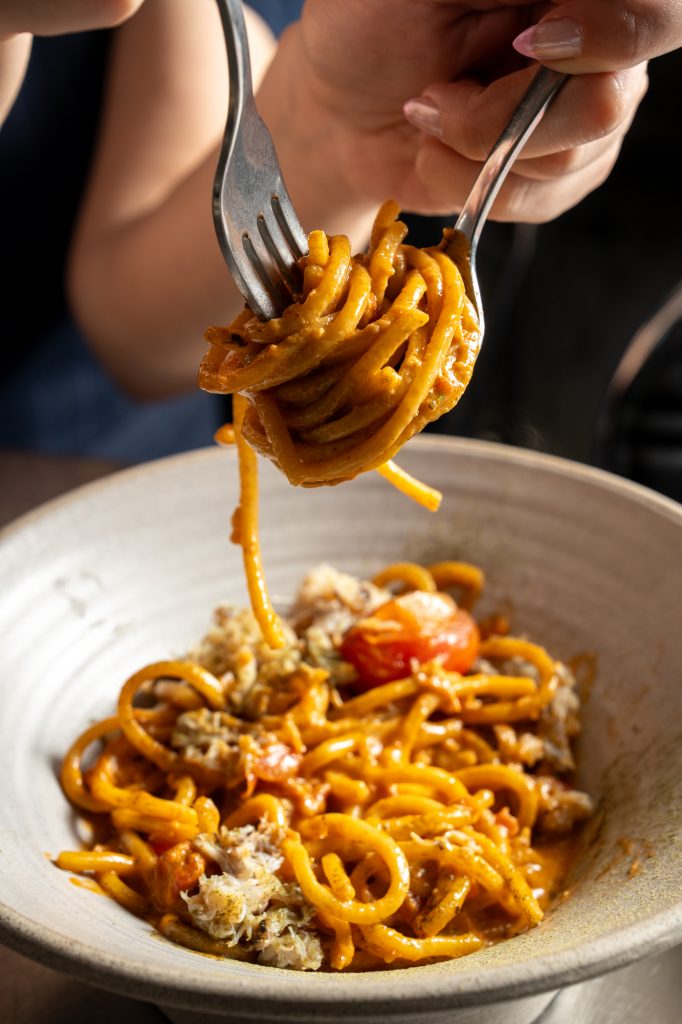
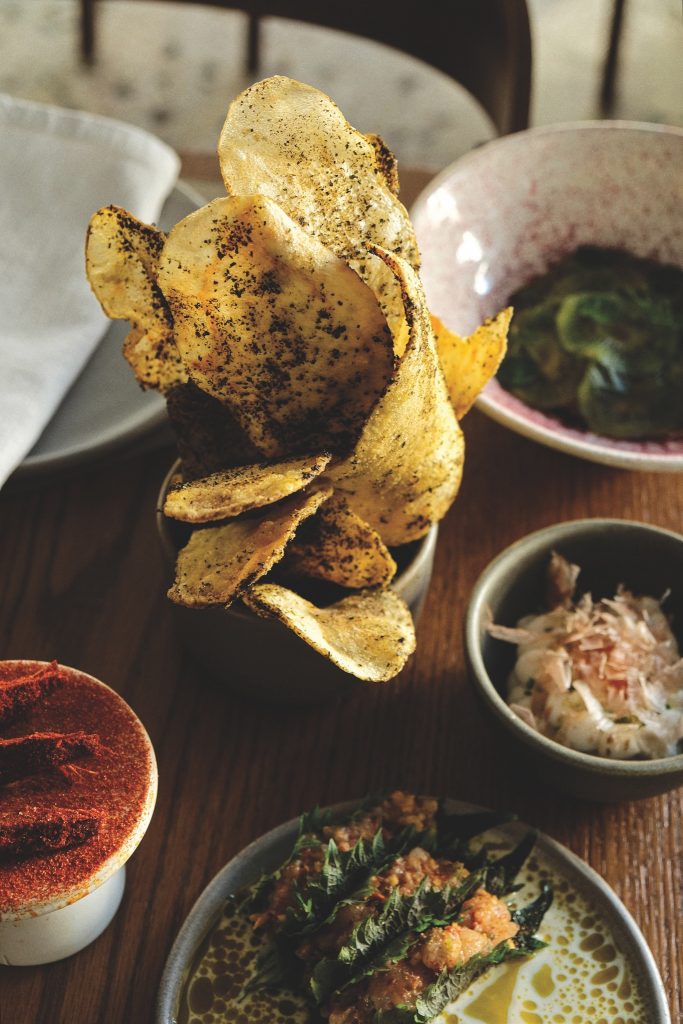
Another recent arrival in Pangrati is Akra, opened in 2023 by chefs Giannis Loukakis and Spyros Pediaditakis. A light-filled, double-height restaurant meets bakery, it’s been a neighbourhood fixture since day one. On the ground floor, seafood, meat, and vegetables are cooked over olive wood, and on the mezzanine level, the pastry team kneads, folds, and shapes dough into bread and pastries. There’s a lot happening in a small space, yet everything seems to move in perfect coordination. Here, too, the focus is on Greek produce, with beef from Kalamata, pork from Drama, and cheeses sourced from across the islands. What’s available on any one day dictates the menu and shapes the recipes. “Our cuisine at Akra is everyday fresh cooking, something that fits into daily life,” says Loukakis. “Food trends come and go, but at some point, everything must stand the test of time and prove its purpose beyond just being fashionable.”
Mantis, the chef at Soil, believes that the Athens food scene is turning away from what he calls “imitation” and moving toward a rediscovery of Greece’s native character. “More and more chefs are turning inward. There’s a growing confidence in looking to local producers, and to the quiet richness of our culinary heritage,” he says. “We see ourselves as part of a broader return to the soil, to origin, to something slower and more intentional. It’s not about breaking new ground; it’s about going deeper into the ground we already stand on.”

Dinners at Soil begin with a tableside introduction to ingredients—flowers, herbs, fruit, seafood—all presented in the “Alepochori box,” named for the village where the restaurant’s garden is located. Flowers are often the starting point for dishes, and many of the lesser-known ingredients on the menu have long been part of the Greek landscape. “They’ve always been growing quietly between the stones, along the coastline, and in forgotten corners of gardens,” says Mantis. “When picked at the exact moment their oils peak, their character is astonishing.” Mantis’s hyperseasonal approach leads him to work closely with foragers who supply him with wild herbs, flowers, and sea plants, some only available for a few days or weeks at a time. “Their arrival often shifts our entire direction. A dish might change completely based on a wild fennel flower or the sudden appearance of rock samphire [an aromatic coastal plant]. What guides us at Soil isn’t a trend or a fixed idea. It’s the pace of nature. It means understanding that we’re not in control, but that we’re in collaboration.”
The result is an extraordinary tasting menu. Dishes like the one-bite eel burger are packed with punchy umami flavours. Plump shrimp from Kiláda in the Peloponnese are marinated inside a woven pouch of kombu, served alongside a spoonful of mussel cream. For dessert, fresh chestnut is grated over an earthy Mont Blanc made of Jerusalem artichoke and black garlic. The restaurant serves everything on dishes designed and made by Mantis’s wife, ceramicist Elia Lampiri, contributing to the feeling that you’re dining in the home of family or friends, being fed by people who truly care about you.
Perhaps this return to roots, to community, to a sense of home through food but with a young, energetic, urban spirit, is something that city dwellers are longing for. It’s clearly a recipe that resonates with Athenians and, along with a focus on seasonality, regional produce, and a reverence for nature, something that every one of these restaurants holds close to its heart. “Ultimately, we want people to walk away not just having had a great meal, but having felt something, a connection to the past and to the energy of the present,” says Pharaoh’s Vallatos.
The feeling is palpable all over the Greek capital right now, and it’s making dining in this thrilling city better than ever.
More like this
Bangkok restaurants
What to Do in Bangkok: One of the World’s Best Chefs on Her Favorite Haunts
Pichaya Soontornyanakij reveals her go-tos in Thailand's buzzing capital.
art and design fashion
The Culture Cut: A Museum Opening, the Return of Gold, and Other Spottings from Around the World
A short and considered list of the latest trends, launches, and openings on our radar.
Trending
-
The Art of Rest: How to Achieve Deep Sleep Every Night
All you want for the holidays is...a good night's rest? Here's how to get it.
-
Bring The Four Seasons
Experience HomeRest peacefully on the world’s most comfortable mattress.
-
Opinion: In Defence of Luck
In the success equation, luck plays an important role.



